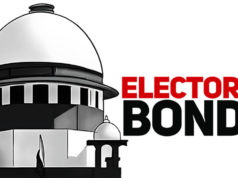Beyond Party Lines: BJP, Trinamool, Congress, DMK, and BRS Among Top Beneficiaries of Electoral Bonds
In the labyrinth of Indian politics, transparency in political financing has been a perennial issue. The electoral bond scheme, introduced by the Narendra Modi-led government, aimed to address this concern by providing a mechanism for transparent donations to political parties. However, recent revelations have cast a shadow over the efficacy of this scheme, fueling a contentious debate over the disclosure of donors and the influence of corporate interests.
An electoral bond functions as a promissory note that can be purchased by Indian citizens or companies incorporated in India from select branches of the State Bank of India. These bonds can then be donated to eligible political parties without disclosing the identity of the donor. The scheme was heralded as a means to curb the influence of black money in politics and ensure transparency in political funding.
The release of data by the Election Commission has brought to light the substantial sums flowing through electoral bonds. The Bharatiya Janata Party (BJP) emerged as the primary beneficiary, having received a staggering Rs 6,987 crore since the scheme’s inception in 2018. Notably, Future Gaming and Hotel Services, led by Santiago Martin, emerged as the top donor for Tamil Nadu’s ruling party, DMK, contributing Rs 509 crore, have stirred further debate.
Apart from the BJP, other parties have also received significant funds through electoral bonds. Trinamool Congress, Congress, and BRS secured notable amounts, with figures standing at Rs 1,397 crore, Rs 1,334 crore, and Rs 1,322 crore respectively. Additionally, Odisha’s ruling party BJD received Rs 944.5 crore, followed by DMK at Rs 656.5 crore, and Andhra Pradesh’s ruling party YSR Congress redeemed bonds worth nearly Rs 442.8 crore.
The JD(S) received bonds worth Rs 89.75 crore, including a contribution of Rs 50 crore from Megha Engineering, the second-largest purchaser of electoral bonds. Future Gaming, the biggest purchaser, acquired bonds worth Rs 1,368 crore, with nearly 37 per cent directed towards the DMK. Other major donors to DMK included Megha Engineering (Rs 105 crore), India Cements (Rs 14 crore), and Sun TV (Rs 100 crore).
Despite the diversity of recipients, questions surrounding the scheme’s transparency and its potential implications for democracy continue to linger, fueling the ongoing debate over electoral bonds and their role in shaping the future of Indian politics. A central point of contention surrounding the electoral bond scheme is the anonymity it grants donors. While some parties, such as DMK, have disclosed donor identities, others like the BJP, Trinamool Congress, Congress, and BRS have opted for secrecy. This lack of transparency has raised concerns about the influence of corporate interests on political decisions and the democratic process.
In response to mounting criticism, the Supreme Court has intervened, advocating for greater transparency in political funding and urging parties to disclose details of donations received through electoral bonds. The Election Commission has echoed these sentiments, emphasizing the importance of transparency to uphold the integrity of the electoral process.
What is an Electoral Bond?
An electoral bond is akin to a promissory note that can be purchased by Indian citizens or companies incorporated in India from select branches of the State Bank of India. These bonds can then be donated to eligible political parties of the donor’s choice. Unlike traditional donations, electoral bonds do not bear the name of the donor, thereby maintaining anonymity. The scheme was introduced to curb the influence of black money in politics and ensure transparency in political funding.
Despite its purported aims, the electoral bond scheme has faced significant controversy. Critics argue that the anonymity it provides to donors undermines the very principles of transparency and accountability it seeks to promote. Furthermore, concerns have been raised about the potential for misuse of the scheme, including the influx of black money into the political sphere. As the debate rages on, the future of electoral bonds and their impact on Indian democracy remain uncertain.






